#tamar bible
Text
Women of Jesus Genealogy by Saint Mathew.
1. Tamar, the righteous woman.

2. Rhab, heroine of the faith.

3. Saint Ruth, virtuous woman.

4. Queen Bathsheba, the gebirah (the great lady).

5. Saint Mary, mother of God.

#tamar wife of judah#tamar bible#rahab#rahab bible#ruth#ruth bible#queen bathsheba#bathsheba mother of solomon#bathsheba bible#mary mother of jesus#st mary mother of god#mary of nazareth#our lady#advent#women of bible#st mathew#jesus christ#catholic church#st joseph#photoleap
8 notes
·
View notes
Text
The women of Jesus's bloodline lists are always interesting, but I feel like if you look it as a woman at other women you are just struck at the love and audacity of God. His audacity in choosing all the women the world would see as the least valuable, and His sincere love for them and making them, their lives, and sacrifices worth something only He could.
Eve the mother of sin, made the mother of salvation.
Sarah the barren wife, made bountiful mother of the gospel to the whole world
Rebbeca daughter of idolatry, made mother of the promise.
Leah unfavored wife, favored by God
Tamar unlucky in marriage, cast asside and forgotten, blessed because she sought justice, and to carry a child of the promise.
Rahab a prostitute, according to the world meant to birth children who are less than even she, mother of kings.
Ruth, widow, homeless, and a forienger. Home and heart of the children of God.
Bathsheba, an adultress who's first child died, matriarch of the one who kills sin and death.
Mary, humble and obedient to the call of God, someone the world called an adultress till the day she died. Standing as a represent every heart accused of a sin they didn't commit, redeemed and vindicated by the very Son of God, her own son as well.
10 notes
·
View notes
Text
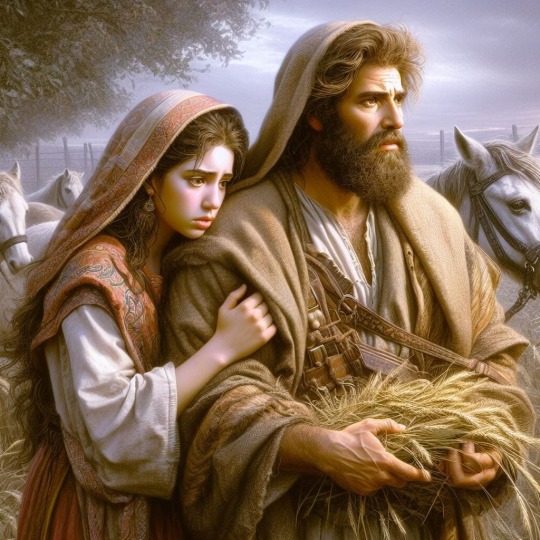
Judah and Tamar
1 And it came to pass at that time, that Judah went down from his brethren, and turned in to a certain Adullamite, whose name was Hirah.
2 And Judah saw there a daughter of a certain Canaanite, whose name was Shuah; and he took her, and went in unto her.
3 And she conceived, and bare a son; and he called his name Er.
4 And she conceived again, and bare a son; and she called his name Onan.
5 And she yet again conceived, and bare a son; and called his name Shelah: and he was at Chezib, when she bare him.
6 And Judah took a wife for Er his firstborn, whose name was Tamar.
7 And Er, Judah's firstborn, was wicked in the sight of the Lord; and the Lord slew him.
8 And Judah said unto Onan, Go in unto thy brother's wife, and marry her, and raise up seed to thy brother.
9 And Onan knew that the seed should not be his; and it came to pass, when he went in unto his brother's wife, that he spilled it on the ground, lest that he should give seed to his brother.
10 And the thing which he did displeased the Lord: wherefore he slew him also.
11 Then said Judah to Tamar his daughter in law, Remain a widow at thy father's house, till Shelah my son be grown: for he said, Lest peradventure he die also, as his brethren did. And Tamar went and dwelt in her father's house.
12 And in process of time the daughter of Shuah Judah's wife died; and Judah was comforted, and went up unto his sheepshearers to Timnath, he and his friend Hirah the Adullamite.
13 And it was told Tamar, saying, Behold thy father in law goeth up to Timnath to shear his sheep.
14 And she put her widow's garments off from her, and covered her with a vail, and wrapped herself, and sat in an open place, which is by the way to Timnath; for she saw that Shelah was grown, and she was not given unto him to wife.
15 When Judah saw her, he thought her to be an harlot; because she had covered her face.
16 And he turned unto her by the way, and said, Go to, I pray thee, let me come in unto thee; (for he knew not that she was his daughter in law.) And she said, What wilt thou give me, that thou mayest come in unto me?
17 And he said, I will send thee a kid from the flock. And she said, Wilt thou give me a pledge, till thou send it?
18 And he said, What pledge shall I give thee? And she said, Thy signet, and thy bracelets, and thy staff that is in thine hand. And he gave it her, and came in unto her, and she conceived by him.
19 And she arose, and went away, and laid by her vail from her, and put on the garments of her widowhood.
20 And Judah sent the kid by the hand of his friend the Adullamite, to receive his pledge from the woman's hand: but he found her not.
21 Then he asked the men of that place, saying, Where is the harlot, that was openly by the way side? And they said, There was no harlot in this place.
22 And he returned to Judah, and said, I cannot find her; and also the men of the place said, that there was no harlot in this place.
23 And Judah said, Let her take it to her, lest we be shamed: behold, I sent this kid, and thou hast not found her.
24 And it came to pass about three months after, that it was told Judah, saying, Tamar thy daughter in law hath played the harlot; and also, behold, she is with child by whoredom. And Judah said, Bring her forth, and let her be burnt.
25 When she was brought forth, she sent to her father in law, saying, By the man, whose these are, am I with child: and she said, Discern, I pray thee, whose are these, the signet, and bracelets, and staff.
26 And Judah acknowledged them, and said, She hath been more righteous than I; because that I gave her not to Shelah my son. And he knew her again no more.
27 And it came to pass in the time of her travail, that, behold, twins were in her womb.
28 And it came to pass, when she travailed, that the one put out his hand: and the midwife took and bound upon his hand a scarlet thread, saying, This came out first.
29 And it came to pass, as he drew back his hand, that, behold, his brother came out: and she said, How hast thou broken forth? this breach be upon thee: therefore his name was called Pharez.
30 And afterward came out his brother, that had the scarlet thread upon his hand: and his name was called Zarah.
— Genesis 38 | King James Version (KJV)
The King James Version Bible is in the public domain.
Cross References: Genesis 4:1; Genesis 24:65; Genesis 25:24; Genesis 37:32; Genesis 41:42; Genesis 46:12; Leviticus 21:9; Numbers 26:19; Deuteronomy 25:6; Joshua 15:1; Joshua 15:10; Joshua 15:35; Joshua 15:57; Ruth 4:12; 1 Samuel 24:17; 1 Chronicles 2:3-4; Nehemiah 11:24; Proverbs 7:10; Matthew 22:24
Genesis 38 (John Gill’s Exposition of the Bible)
#Judah#Tamar#righteousness#Onan#the sin of Onan#Genesis 38#Book of Genesis#Old Testament#KJV#King James Version Bible
7 notes
·
View notes
Text

Here's a picture of Tamar, the pious pretend prostitute (Genesis 38), who I drew for Mother's Day. I started writing up her story, too, but I dramatized it and it got too long and it might just be a novella now?
92 notes
·
View notes
Note
Man, I'm going a bit crazy with the idea of Mephiboseth and Absalom a bit here like, for starters Mephisboseth has to deal with the whole drama that if it wasn't because he had already been injured that the people who took care of him would have never loved him or let him live long enough as he is now. Cuz he is the heir of Jonathan after all, but also its the exact reason that he is the son of Jonathan that David cares about the boy so much, maybe just as much as Solomon, even though it isn't so noticeable when there's a lot of the problems in the family that arouse due to David's many wives and children.
One of which is of course Absalom. And to an extent I feel like he would become jealous but, I also like to think about he would grow out of that when he sees that 1)Mephisboseth poses no threat to him, heck less threat than his brothers currently do, 2) He seems a bit more lonely in the regard that he is the only heir of a lost family whose only person he could call a familiar being the maid that saved and keeps caring for him like a mother. And 3) Maybe the idea of Tamar being close to Mephisboseth would be nice to write about (but will also add a sadder tone when Mephisboseth can't do anything about what's going to happen to Tamar. 😔) especially considering how her other bothers might be.
Like maybe Mephisboseth is also quite the contrast compared to Absalom who is pompous and extroverted in his own regard. Like even when the deals of the court get to be too much Absalom can go back to Mephisboseth because with him there's no need to put on a show so that he can look better than his two (one really, the second son seems to be as invisible as middle child gets) brothers. After some years he might not care much about his father's favoritism because well, he knows he is great enough by himself. Not as wise as Solomon but enough, probably because Mephisboseth and Tamar hype him up a lot. (And that care that Tamar shows to them probably is what makes Amnon so bitter to the point of committing horrible things in the first place. Because not only is he hurting Tamar, he also hurts Absalom who wasn't present at the one time Tamar needed her, and Mephisboseth who even if he was, wouldn't have been strong enough to help her— or maybe would have tried and ended up getting more hurt because of his disability.)
Either way of how you put the story, the tragedy will so deep throat that I can't stop thinking about it.
And sidenote, the fact that Siba was kept in charge of Mephiboseth during the rebellion of Absalom was just a little note honestly but my mind went to the idea that maybe, because Mephiboseth cares about Absalom so much he would have tried to help him in any way he can, and David— who had met in secret with Jonathan before, who knows the lengths he would have gone for to be with the one he loves– tries to impose him from meeting Absalom in the case that another son of his, the son of *Jonathan*, dies. (Not to mention he would also have broken his covenant with Jonathan if Mephiboseth were to die.)
Sorry mate. I'm so sorry but you are suffering with me after giving me this idea 😔
Hey, I have no problem suffering with you! Where are all my papers on Mephi/Absolom stuff!? 😫
I couldn't agree with you more on this! There are so many themes you could explore with a story about Mephiboseth. The conflicts... The emotional turmoil... aahh! I believe the dynamic between Absolom and Mephi would be such a fascinating aspect.
Mephiboseth suffered greatly from the trauma of his accident and the sudden loss of his father in one single day. Following this, Siba, Saul's servant, tended to him and relocated him to a place literary called “Nothing,” reinforcing Mephi’s belief that he is insignificant. Even in the Bible, his insecurity is evident as he refers to himself as “nothing more than a dead dog.” Therefore, when he gets an summon to David’s palace and meet the king and his family for the first time, I always wonder about what is his perspective? Does Mephi harbor resentment? Is there jealousy towards Absalom and David’s other sons who grew up in a luxurious palace— a life that was meant to be his? And imagine if Jonathan had survived, then Absalom and Mephiboseth would have grown up together as brothers….
And yhea, It is pretty much canon that Absolom and Mephiboseth are the opposite from each other. Like you said, one is beautiful, popular, pompous, extroverted and a prince. And the other is lame, introverted and a "nobody". Which is something I can eat everyday! I just love the opposite attracts trope!
For Absalom, he had grown up in a grand palace that strictly forbade the presence of anyone with disabilities. David, for a really stupid reason, held a strong dislike towards those who were blind or deaf. However, everything took a different turn when David brought a new child into the court, publicly declaring him as his own son and warning sternly that any harm towards the boy would be met with severe consequences. I think this sudden change could leave Absalom confused and somewhat resentful of his father's abrupt favoritism towards this random boy. He probably would feel jealous at first, but probably quickly shifts and not lingering on these emotions for long.
I also see that the relationship between David and Mephiboseth is not entirely healthy. David's protectiveness towards Mephiboseth could even borders to an obsession, stemming from his fear of losing "Jonathan” again. I thinks that Mephi would looks and resembling his father in every way, When Mephiboseth stands before him, David is overcome with emotion.
Picture him trembling on the floor before the king, uncertain of his fate, why he is here. In a surprising turn, David pulls him into a tight embrace, tears streaming down his face, perhaps softly uttering Jonathan's name. Confused and hesitant, Mephiboseth eventually returns the hug. 😭
David has good intentions and cares deeply for Mephiboseth, but his love for him seems to come with conditions. It raises the question of whether David's affection for Mephiboseth would remain unchanged if he were not Jonathan's son. The likely answer is no, something that Mephiboseth probably already knows about. The only reason David lifts the ban on disabled individuals entering the palace is because he desires to have Mephiboseth live with him and his family.
Then we have David's overprotectiveness during the rebellion. Despite being torn between loyalty to Absalom and David, Mephiboseth is forced to remain at the palace due to Siba's influence. Siba, believing that a lame person should not stand beside the King, prevents Mephiboseth from joining David but as well not allowed to follow Absalom. It could be that David might actually be alright with leaving Mephiboseth behind at the palace. A recurring theme in "The Prince’s Psalm" is how others underestimate David and try to forces him to stay low and at home. His family unknowingly hurts him when they are doing it. This mirrors how David unknowingly makes the same the mistreatment he endured from his brothers onto Mephiboseth.
There could be also a theme with David not viewing Mephibosheth as his own person. When Siba lies that Mephibosheth has betrayed David and that he has left the palace, David becomes enraged and gives all the inheritance that he would give to Mephibosheth to Siba instead, not taking time to think or ask for evidence. It also shows that he doesn’t really know Mephibosheth, that he immediately believes someone else's words. It gives the feeling of "putting him on a pedestal." What I'm trying to say here is that David loves Mephibosheth for Jonathan’s sake. It's a beautiful thing between David and Jonathan but not as much for Mephibosheth, if you know what I mean.
And there are so many parallels between David and Jonathan’s story with Absalom and Mephibosheth. It has the same story beats but the roles are reversed. The "shepherd" stays in the castle while the prince is on the run from the king.
Regarding Tamar, it's a very sensitive topic. The assault of Tamar in the Bible is only used as motivation for Absalom to start the rebellion. After that, Tamar isn't important narratively anymore. She is only mentioned once more after the assault, when Absalom names his firstborn after his sister. This act struck me as such sweet thing, cuz it's probably the only time in the Bible where a male character celebrates having a daughter. Personally, I've always been uncomfortable with female characters experiencing trauma solely to drive the motivations of male characters. As well as that a character would sexually abuse another character just to hurt someone else. Amnon comes across as nothing more than a creepy stalker in the bible, and I don't think he doesn't need any additional motivation for assaulting Tamar. Like you said, I really like the idea of having Mephibosheth and Tamar become good friends, leading Amnon to feel jealousy. But it wouldn’t be the main factor why he was harming Tamar in the first place. He was obsessed with her already and resorted to trickery to manipulate David into sending her alone to his bedchamber—a situation that would never have occurred if she hadn't been ordered or coerced into it. I do think that both Absalom and Mephi would blame themselves that they couldn't protect her but then Absalom redirects that resentment towards David. This would happened to Mephi as well but he becomes conflicted. That he don't want to blame David for forcing Tamar to be alone with Amnon at first but then realize it later. I'm not sure about what I could add to Tamar's story…. Perhaps keeping her involved in the story could enhance her character arc? For instance, instead of Siba aiding Mephibosheth in meeting Absalom secretly, maybe Tamar could fulfill this role instead? I dunno, I'm not sure.
Though if Mephibosheth and Absalom's relationship were romantic, then David would probably immediately spot it. ��� I don’t think that he would mind in the beginning, and even it would make him reminisce his memories with Jonathan. But when Absalom starts the rebellion, he obviously sees him as a threat to Mephibosheth. And after Absalom’s death… Yeah, there we have the sad juice. David mourns for his son's death and we have Mephibosheth mourning too by David's side. It's like a reflection of Saul and Jonathan, but this time, it’s “David” who died. And it's the King and the “prince“ still living.
I WANT THIS TO BE A BOOK SO MUCH! 😫
19 notes
·
View notes
Text
"But Naomi is Ruth's mother in law--" just wait until you hear about levirate marriage and kinsman redeemers
#literally the entire basis of the book of ruth lol#book of ruth#ruth and naomi#bible stuff#and don't get me started on jacob marrying his cousins#or abraham either being sarah's uncle or half-brother...#or judah and tamar#i can go on#mop#wlw
2 notes
·
View notes
Photo
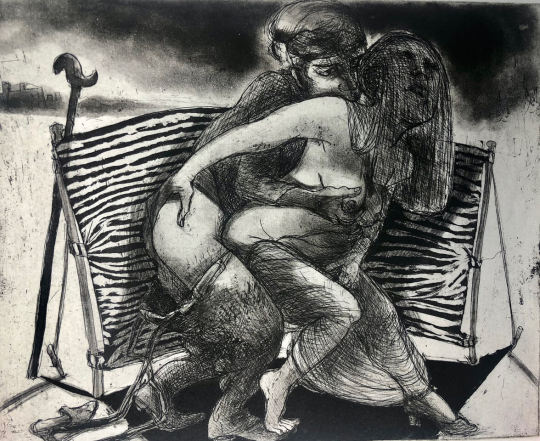
The last laugh
Marcelle Hanselaar’s etching, part of a series made in 2022, presents a scene from Genesis 38: Judah, son of the Israelite patriarch Jacob, sees a veiled woman by the roadside and assumes she’s a prostitute. “Come,” he says, “let me come in to you.” For payment he promises her a goat. The veiled woman accepts – on condition that she can hold on to his signet, cord, and staff as a guarantee of that goat. When Judah later tries to send the payment, the locals deny the existence of any prostitutes. Months later, rumor reaches Judah that his daughter-in-law Tamar, a childless widow, is pregnant as a result of whoredom. He condemns her to be burned, but Tamar is a few moves ahead in her chess game. She returns the signet and the cord and the staff with a message: “It was the owner of these who made me pregnant.”
Under the tradition of levirate marriage, Tamar had a right to bear children with Judah’s youngest son (brother of her first two husbands, both slain by God) which Judah had denied her. When Judah realizes that Tamar has used him to get pregnant, he basically accepts that she was just taking what was legally hers.
#oh snap#tamar#judah and tamar#Marcelle Hanselaar#genesis 38#rebel women#Rebel women of the Apogrypha#women in the bible
23 notes
·
View notes
Text
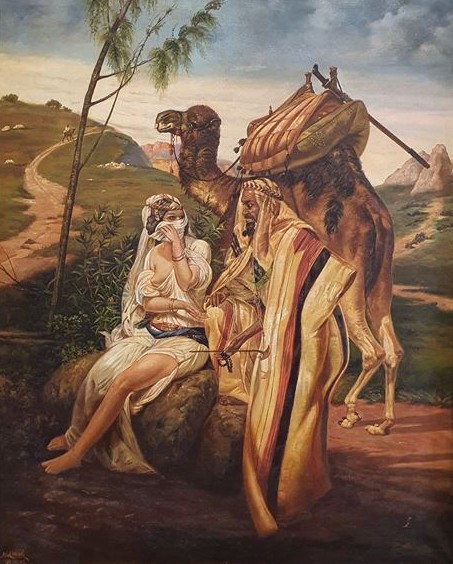
Juda et Thamar (1840) by Horace Vernet
#Horace Vernet#19th century#art history#biblical painting#old testament#tamar#judah#orientalist art#bible art#judiasm#Christianity#islam#abrahamic religions#abrahamic mythology#french art#french painter
12 notes
·
View notes
Text
Ammon

View On WordPress
1 note
·
View note
Text
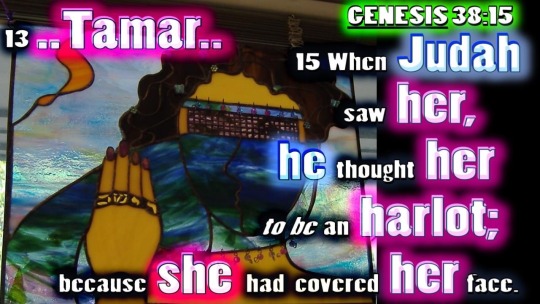
#genesis 38:15#tamar#playing the harlot#judah#covering your face#daily bread#nightly bread#god is love#bible
0 notes
Text
HER STORY: Season 3, Exodus Pioneers, Rahab
Bawdy innkeeper, canny businesswoman, Canaanite idolater, she was called out of Jericho, and into Bethlehem.
#Rahab #Jericho #BibleStudy #Joshua #BookofJoshua #Tamar #Judah #Ruth #Boaz #Bible #BrokenSearchingTrustedPowerful
As Rahab stood in the foothills of Canaan, watching Jericho burn, she was seeing everything she knew, her whole life, and what should have been her story, going up in smoke. But for the grace of God. . . .that would have been her.
She may have wondered to herself, so many years later, “How is it that God saved me? How is it that my life story took such an unexpected, wrenching, and yet…

View On WordPress
#biblical woman#biblical women#Boaz#book of Ruth#egal#Egalitarian#Jericho#Joshua#Joshua 2#Joshua 6#Judah#Rahab#Ruth#Tamar#women in Scripture#Women in the Bible#women of the Bible
0 notes
Text
David: Parenting Courageously
Absalom Murders Amnonby Gaspare Traversi (1752)Wikimedia Commons
David had a large family. David had eight wives, many concubines, nineteen sons, and at least one daughter. Before he became the king of a united monarchy, David had three wives: David’s first wife was Michal, the daughter of Saul. Michal did not give any children to David. David’s second wife was Ahinoam, a woman from Jezreel. She…

View On WordPress
0 notes
Text
The two Tamars fit into narratives that are often omitted:
There are two women named Tamar in the Bible. Both are ambiguous, one associated with a particular reality of the ancient world and outmaneuvering a set of attempts by Judah, the ancestor of the tribe of Judah, aka Judea, aka well....to deny her what she was owed. She outsmarted him and made it stick.
The other one serves mainly as a bit player in the role of the civil war of David and Absalom. The Tamars show the earthiness of the Bible and as such Christianity's attitude to them is 'I didn't see no Tamar', where the Jewish take tends to focus on them more directly with the first, in particular, in the Lilith category of 'modern Jewish feminists decided this person is rightly demonized for the wrong reasons.'
#lightdancer comments on history#women's history month#the bible and women's history#judaism and women's history#christianity and women's history#tamar
1 note
·
View note
Text
Tamar, Judah, Joseph, and Jesus
Genesis 38-39, Psalm 11, Matthew 13:36-58
The story of Judah and Tamar seems really strange in our culture, but I think, I think, it's actually not being critical of Tamar. She needed something to be considered valuable in her culture (children) and she was being unjustly denied it, first by her husband's brother, and then by her father in law, who did not, as custom would dictate, make her a husband of his next son. So she takes initiative in a way that is unacceptable by most sexual ethics but causes Judah to say of her that she is more righteous than he is. She disguises herself as a shrine prostitute (a normal thing in those days the patronage of whom was a common form of worship) and engages her father in law to become pregnant by him. Eventually she is in trouble for being pregnant out of wedlock and Judah defends her.
I don't have much to say about this story except that it's weirdly complementary of all involved. The notable exceptions are Tamar's first two husbands who were wicked and so "God put [them] to death." The second was wicked precisely because he did not give his new wife the children (and therefore support, respect, and social place) that was right in that culture.
Jesus talks more today about the kingdom of God and what it is like. It's like a treasure hidden in a field that somebody sold all his posessions for. It's like a pearl that somebody sold all his posessions to buy. It's like a net full of fish from which the good will be sorted from the bad. I'm a little concerned about how much Jesus talks about Hell here. I like to say that I have never found the concept of heaven and hell or eternity in general to be a particularly motivating concept for me. They're concepts I don't understand in the slightest. I am more concerned about the life before death, about how we treat each other now.
And besides, Jesus is pretty clear that many of the people who are going to hell are going to be the ones who were confident they were serving him. And that's a little unnerving. I'm not entirely confident he was just talking about republicans.
0 notes
Text
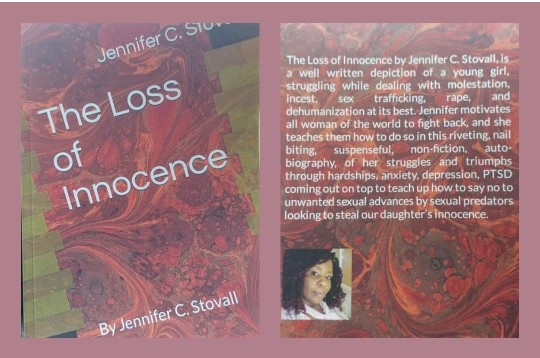

#christian bible#love yourself#relationships#tamar braxton#trina braxton#self healing#self esteem#toni braxton#towanda braxton#oprah winfrey
0 notes
Text
Biblical Womanhood
On Sunday afternoon, I was riding in a car with two of my queer religious friends, Calvin Burke and Nathan McLaughlin, and one of them mentioned the phrase “Biblical womanhood,” and how it’s used to say that women should be a submissive wife, a diligent homemaker, and a loving mother. But this sort of understanding only works if someone hasn’t read the entire Bible.
Actual Biblical womanhood is quite different. We spent a good 20 minutes naming examples from the Bible of good women and what we can learn from them.
Esther stood up to her husband the king to force him to change the law
Ruth vowed her life to a woman and works hard to support her
Mary, the mother of Jesus, preached that her son would overthrow the rich
Leah pretended to be her sister in order to marry a husband
Eve chose a path different from what Adam wanted and convinced him to come along
Deborah was a prophetess
Junia was an apostle
Hagar met God and gave him a name (there’s no record of God accepting a name from a man)
Mary of Bethany chose not to do housework but instead to listen to Jesus teach
Rahab is a prostitute who turned spy to betray the city where she lived
Anna prophesied about Christ
Hannah was a prophetess
Tamar pretended to be a prostitute and sleeps with her father-in-law, becomes pregnant, in order to force him to financially take care of her
Jael killed the head of the enemy’s army
Phoebe was a deacon
Rebecca tricked her husband into giving the inheritance to a different son than he intended
Shiphrah and Puah both disobeyed the law in order to save babies
Susanna financially supported Jesus
I don’t know how anyone can read this list and think the Bible’s definition of a good woman is someone who doesn’t talk back, doesn’t work outside the home, but instead cleans house and raises children while submitting to her husband’s will. Actual Biblical womanhood applies to women who are married, who are single, who are childless, there is no one definition of what a woman should be. She can have power. She can preach the gospel. She can be a mom and home keeper. She can be a prophet, an apostle, a deacon. She can disrupt her husband’s plans.
126 notes
·
View notes